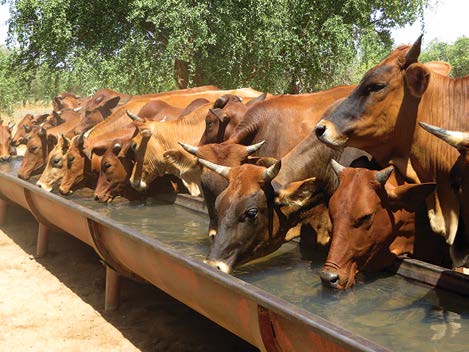BLAZING TRAILS FOR REGIONAL PASTORALISM

Pastoralism is crucially important to the Sahel, but it is under threat. The Regional Sahel Pastoralism Support Project (PRAPS) financed by the World Bank, is a collaboration of six Sahelian countries supported by IDA $248 million, is working to improve productivity, sustainability, and resilience of pastoral livelihoods, and benefitting nearly two million people.
The Sahel is home to 20 million pastoralists and about 220 million cattle, sheep, and goats. It receives just 200–800 millimeters of rainfall a year, leaving its vegetation sparse and fragile. People have adapted by ranging with their livestock across large areas, often crossing national borders. It is a tough life that is only getting tougher for pastoralists like Sekou Bah. Tending to his cattle on rocky terrain some 60 kilometers outside Bamako, Mali, he feels the pinch of increased agriculture in the region.
“There are farm fields everywhere, so we are forced to come here even if it has terrible consequences on the animals’ health,” laments Bah. “We would really like the authorities to create trails so we can better access natural resources.” Across the Sahel, agricultural expansion and urban sprawl have shrunk the rangelands historically used by pastoralists. Contagious, transboundary animal diseases further compromise animal production and productivity, as do more frequent ebilitating droughts and floods. These challenges contribute to increased economic vulnerability and a rise in conflicts over resources. Forty percent of the region’s pastoralists live in extreme poverty; yet, their livestock account for 10–20 percent of GDP of some Sahelian countries. Significant portions of the meat and milk consumed in western Africa come from the Sahel, and demand for meat is expected to increase 150 percent by 2050 from 2005–2007 levels as populations and economies grow. The Regional Sahel Pastoralism Support Project (Projet Régional d’Appui au Pastoralisme au Sahel, or PRAPS) is working to address the challenges and ensure that the economic opportunities generated by the growing demand for livestock products translate into widespread benefits for communities that depend on pastoralism for their livelihood. Launched in 2015 with $248 million in IDA funding, PRAPS is helping to increase access to resources, production services, and markets for pastoralists and agro-pastoralists along their routes for moving livestock and in border areas of six countries of the Sahel. It is also working to improve these countries’ capacities to respond to crises. Nearly two million people, a third of whom are women, are benefitting.
Catalyzing cooperation
PRAPS multisectoral, holistic approach brings together the private sector, pastoral organizations, advanced research institutes, and national, regional, and international stakeholders to collaborate on a range of coordinated solutions. The Comité Permanent Inter-Etats de Lutte contre la Sécheresse dans le Sahel (CILSS) oversees collective action at the regional level.
For example, PRAPS countries have been able to enhance their national veterinary systems and harmonize strategies on promoting animal disease surveillance, vaccinations, and proper use of veterinary drugs.
“The synergy between the breeder and the veterinarian is to always be together hand in hand,” says Ahmat Adoum Aboulfathi, head of the Confederation of Professional Organizations of Livestock Producers and Actors in Chad. “We must plan together the present and the future of livestock.”
PRAPS support for infrastructure and equipment and its platform for multi-stakeholder cooperation—has led to more than 160 million animals vaccinated against Contagious Bovine Pleuropneumonia and Small Ruminant Plague, two diseases that can devastate herds.
Increasing access to land, water, and markets
This regional collaboration extends to land management to ease the movement of animals across landscapes and increase pastoralists’ access to critical water resources. PRAPS backs strategic investments to restore and mark livestock corridors, particularly those that cross national borders. Social agreements ensure infrastructure and grazing areas are cooperatively managed.
In Burkina Faso, for example, PRAPS is helping to legally secure degraded land as ‘passage zones’ where natural resources can regenerate. Water points and rest areas are being established at key points to improve conditions for animals on the move. To date, more than 1.5 million hectares of land have been brought under sustainable management across PRAPS countries, and close to 400 additional water points are expected to be accessible to pastoralists and agro-pastoralists by 2022.
Source: The World Bank (CATALYZING REGIONAL INTEGRATION IN AFRICA PUBLICATION)

